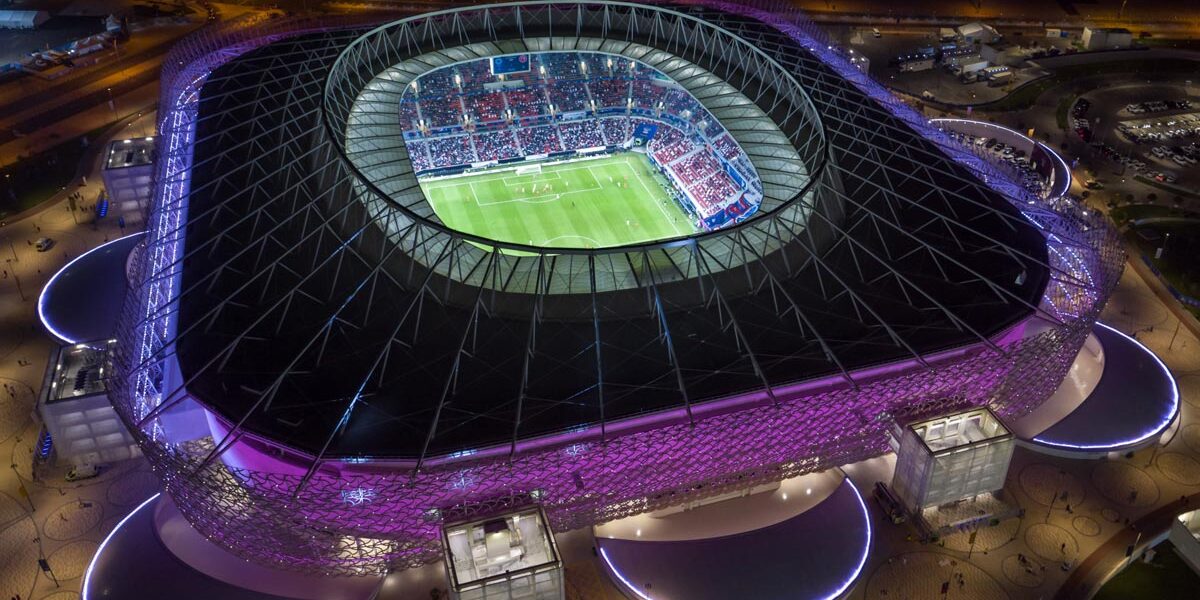Jahangir Mohammed, Director of Ayaan Institute, says that while the focus of the world will be on football at the upcoming World Cup in Qatar, we should not forget the mainly South Asian migrant workers who have made the tournament possible in the first place.
In just over a month, Qatar will host the first football world cup in a Muslim and Arab country. Whilst Qatar’s promotion of the world has been slick, it is likely to be a challenging experience, as well as a memorable occasion.
Qatar is a tiny country. Wales in the United Kingdom is almost twice as big. The population of Wales at around 3,107,500 is greater than that of Qatar at around 2,695,122. Yet this tiny island expects to accommodate 1.5 million additional people for a month. This presents a huge management challenge in terms of people and resources. The government has taken measures to accommodate such large numbers of people, dealing with the challenges of additional traffic and lack of facilities, often at the expense of migrant workers.
Qatar won the competition to stage the World Cup in 2010. Since then, it has virtually developed the entire infrastructure of the country. It has built brand-new stadiums, and hotels, developed areas to host fans, built a brand-new metro system, new roads, and freeways, new shopping malls, and re-opened a closed old airport, and much more. It is not surprising therefore that Qatar has been reported to have spent some $220 Billion since 2010 on the world cup. Whilst Russia, the host of the last world cup in 2018 spent only $11.6 Billion. There will, of course, be real questions about the sustainability of this investment post world cup, however, there is no doubt that the Qataris with vast wealth at their disposal, will make it work.
Another interesting challenge will be the mixing of different people and cultures on a small, congested Island. An experiment in co-existence and tolerance, albeit for a limited period. Qatar like the other Gulf States already has an interesting population mix. Of its 2.6 million people only 12% (331,00) are Qatari citizens or locals. The remainder of its population (88%) are expatriate workers from over 40 other countries, primarily from South Asia, the majority of around 750,000 who are Indian.
Most expatriate workers are not allowed to, or able to afford to bring their wives and families to live with them. As a result, Qatar’s population is around 74% male. Qatar is a conservative religious country being subjected to a large influx of primarily non-religious people from around the world, including women. The government has relaxed many of its religious prohibitions such as the consumption of alcohol, dress code, and unmarried couples staying in hotels to accommodate non-Islamic lifestyles and cultures. However, this influx of people with diverse cultures, habits, and lifestyles in an overcrowded place, has the potential for social problems, including racism, directed at South Asian workers, from people of other countries, including Europe. Given the predominance of males in the country, the world cup may not be a friendly experience for women. How the conservative local Qatari citizens react to all this will also be of much interest. To manage the potential for conflict the Qatari government has contracted Turkish police (with some French) and British Counter Terrorism police.
Human Rights Criticisms.
The World Cup has focused global attention on Qatar’s employment practices and human rights concerns. Until recently, Qatari global hard and soft power had shielded it from extensive media and political scrutiny about the abuse of workers and rights issues. Qatar has major property and financial investments in Western countries, as well as universities, research institutes, and think tanks. Its investment in property in London is well documented. Its soft power on the other hand has been expressed through its support for Muslim groups, movements, and charities. This has meant that it is often seen as a country that supports Islam and Islamic practices by Muslims. Western-based Muslim groups and Islamic activists have, as a result, avoided speaking out on legitimate concerns of racism and the exploitation of migrant labour in the country.
The world cup, however, has brought a greater focus on Qatari life, wealth distribution, and politics, that otherwise would not have taken place. There are genuine issues of concern in Qatar, and sports are often a way of raising those issues in a way that politicians often fail to do. Sports were a major driver of change in apartheid South Africa for example. I do not have a problem with sports being used to raise issues of serious exploitation and oppressive policies. If players want to wear an armband or wave a flag of a cause that they feel strongly about, then that is their prerogative.
However, the level of criticism that has been aimed at Qatar, and in some cases vitriol, with even calls for a boycott of the World Cup, go well beyond what has happened in previous world cups. This is particularly the case because Qatar is a Muslim country and has different religious core values to that of the West on some issues, such as LGBTQ and relationships between men and women.
The last four world cups were held in Russia, Brazil, South Africa, and Germany, and in 1994 in the USA. All these countries had serious human rights/exploitation issues at the time. Germany in 2006 still had issues with “guest workers” and attacks on migrant workers. I do not recall such a level of media criticism and activism directed at any of these countries.
Qatar has already made some compromises on the issues which are central to its centuries-old religious beliefs, working with FIFA. It is entirely unrealistic to expect Qatar to abandon its religious values and way of life simply because they are holding a football tournament. The overall interaction of people and cultures from around the world with people in Qatar will hopefully be positive, and produce a better understanding and appreciation of local issues.
Remember Those who built the Pyramids.
People marvel at and visit the pyramids in Egypt thousands of years after they were built. The mummified bodies of the Pharaohs are preserved, discovered, and exhibited with all their splendour and wealth buried and preserved with them (believing it would make life comfortable for them in the next world). Yet nobody remembers the poor souls who laboured to build them. The movement of tons of rocks by what many now believe were paid workers rather than slaves, left many thousand dead and injured, although few records were kept.
The modern development and infrastructure in the Gulf states are impressive. Many visitors marvel at Arabian deserts being transformed into the most built-up, developed, and wealthy states in the world. Qatar has followed in the path of the United Arab Emirates and the world cup has speeded up its development process. The development of places like Dubai, Qatar, and other gulf emirates has been done on the back of an army of South Asian labourers who for decades have toiled and been exploited through the kafala employment system, with appalling living conditions, and other restrictive practices. They are denied the opportunity to use the benefits of their labour and turn them into local investments and businesses without partnering with locals (as they would be able to in the West). They are even restricted from living a proper family life.
It is these labourers, who have been at the bottom of a caste-like employment system. Yet, it is the South Asian populations and expatriates who effectively manage the economy of these countries. Without them, these countries would cease to function and generate the wealth they do, which mostly benefits the local citizens, who are looked after by the state for life.
One of the benefits of the world cup being in Qatar is that it has brought greater awareness and scrutiny of employment practices of expatriate labour in Gulf states. Under international pressure, some improvements in working practices, including the infamous Kafala system of employment in Qatar, have been made, but there is a long way to go.
In the Gulf, those who generate the wealth of these states, have the least share of it. In my opinion, the conditions and lives of these workers is the big human rights issue, simply because these people represent the majority population of the country and therefore the most affected.
I hope FIFA and the football players will pay tribute to the workers who have built Qatar and will manage the World Cup 2022 (even wear an armband in solidarity). I also hope that the Qatari rulers will share some of the wealth they generate with those who helped build and manage the country. As for the football fans, I do hope that they will treat the local workers with respect and well, as they are the ones they will mostly see and interact with. If things go wrong, it is these workers who will get abused and pay the price for failure.
I do not doubt that Qatar with its immense wealth will deliver a magnificent spectacle and tournament for the world to see. It also promises to be an event that will bring together many races and cultures in proximity to one another and will hopefully remove preconceived ideas about both Qatar and people on all sides. I attended the Expo 2022 in Dubai at the beginning of the year, and it was a thoroughly enjoyable experience visiting the tents of different countries and seeing people from all around the world come together. Even the criticism of Qatar is and will hopefully have a positive impact. It is much better that learning and change happen through human interaction and critique, and via sport than war.
As a Muslim, Westerner, and football fan, I am genuinely looking forward to the first world cup in a Muslim country, as well as the football. However, I do hope we all remember those who built the Pyramids of today in Arabia, and for a long time to come.



Leave a Reply